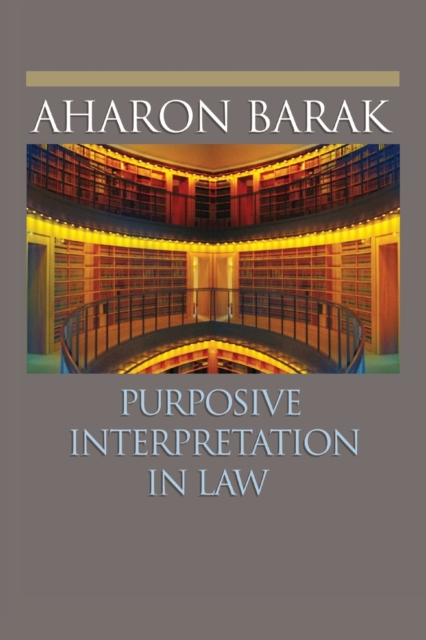Purposive Interpretation in Law

Purposive Interpretation in Law
This book presents a comprehensive theory of legal interpretation, by a leading judge and legal theorist. Currently, legal philosophers and jurists apply different theories of interpretation to constitutions, statutes, rules, wills, and contracts. Aharon Barak argues that an alternative approach--purposive interpretation--allows jurists and scholars to approach all legal texts in a similar manner while remaining sensitive to the important differences. Moreover, regardless of whether purposive interpretation amounts to a unifying theory, it would still be superior to other methods of interpretation in tackling each kind of text separately.
Barak explains purposive interpretation as follows: All legal interpretation must start by establishing a range of semantic meanings for a given text, from which the legal meaning is then drawn. In purposive interpretation, the text's "purpose" is the criterion for establishing which of the semantic meanings yields the legal meaning. Establishing the ultimate purpose--and thus the legal meaning--depends on the relationship between the subjective and objective purposes; that is, between the original intent of the text's author and the intent of a reasonable author and of the legal system at the time of interpretation. This is easy to establish when the subjective and objective purposes coincide. But when they don't, the relative weight given to each purpose depends on the nature of the text. For example, subjective purpose is given substantial weight in interpreting a will; objective purpose, in interpreting a constitution. Barak develops this theory with masterful scholarship and close attention to its practical application. Throughout, he contrasts his approach with that of textualists and neotextualists such as Antonin Scalia, pragmatists such as Richard Posner, and legal philosophers such as Ronald Dworkin. This book represents a profoundly important contribution to legal scholarship and a major alternative to interpretive approaches advanced by other leading figures in the judicial world.PRP: 441.75 Lei
Acesta este Prețul Recomandat de Producător. Prețul de vânzare al produsului este afișat mai jos.
353.40Lei
353.40Lei
441.75 LeiLivrare in 2-4 saptamani
Descrierea produsului
This book presents a comprehensive theory of legal interpretation, by a leading judge and legal theorist. Currently, legal philosophers and jurists apply different theories of interpretation to constitutions, statutes, rules, wills, and contracts. Aharon Barak argues that an alternative approach--purposive interpretation--allows jurists and scholars to approach all legal texts in a similar manner while remaining sensitive to the important differences. Moreover, regardless of whether purposive interpretation amounts to a unifying theory, it would still be superior to other methods of interpretation in tackling each kind of text separately.
Barak explains purposive interpretation as follows: All legal interpretation must start by establishing a range of semantic meanings for a given text, from which the legal meaning is then drawn. In purposive interpretation, the text's "purpose" is the criterion for establishing which of the semantic meanings yields the legal meaning. Establishing the ultimate purpose--and thus the legal meaning--depends on the relationship between the subjective and objective purposes; that is, between the original intent of the text's author and the intent of a reasonable author and of the legal system at the time of interpretation. This is easy to establish when the subjective and objective purposes coincide. But when they don't, the relative weight given to each purpose depends on the nature of the text. For example, subjective purpose is given substantial weight in interpreting a will; objective purpose, in interpreting a constitution. Barak develops this theory with masterful scholarship and close attention to its practical application. Throughout, he contrasts his approach with that of textualists and neotextualists such as Antonin Scalia, pragmatists such as Richard Posner, and legal philosophers such as Ronald Dworkin. This book represents a profoundly important contribution to legal scholarship and a major alternative to interpretive approaches advanced by other leading figures in the judicial world.Detaliile produsului










